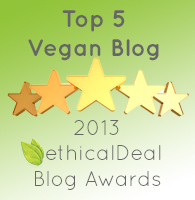 It’s our puppy’s first birthday this week and I’m thinking of inviting a couple of her doggie friends over for a little party. Her first year has been quite the fun-filled and entertaining experience for the whole family and a celebration of the end of her puppyhood feels bittersweet. It’s really been never a dull moment! After all, we (as pet owners) put so much time, love, patience and work into making sure our pets happy, obedient, healthy and well-adjusted that it amounts to a big investment on many levels. But as pet-lovers know, the rewards come back ten-fold. The year went so fast and it’s hard to believe that my little Babka (yes, that’s her ridiculous name) is growing up and mellowing just a bit—not that she isn’t still unraveling toilet paper and stealing underwear and occasionally pooping in the living room (do I detect a trend?)—but we are definitely moving towards the adult stage of life.
It’s our puppy’s first birthday this week and I’m thinking of inviting a couple of her doggie friends over for a little party. Her first year has been quite the fun-filled and entertaining experience for the whole family and a celebration of the end of her puppyhood feels bittersweet. It’s really been never a dull moment! After all, we (as pet owners) put so much time, love, patience and work into making sure our pets happy, obedient, healthy and well-adjusted that it amounts to a big investment on many levels. But as pet-lovers know, the rewards come back ten-fold. The year went so fast and it’s hard to believe that my little Babka (yes, that’s her ridiculous name) is growing up and mellowing just a bit—not that she isn’t still unraveling toilet paper and stealing underwear and occasionally pooping in the living room (do I detect a trend?)—but we are definitely moving towards the adult stage of life.
 Believe it or not, I have come across many sites that discuss raising a vegan dog! As a vegan human, all this information on the topic has caused me to wonder about the pros and cons of raising a dog vegan. My gut feeling has been “of course not—dogs are predatory and eat meat!” And, “just because I eat vegan, I can’t foist that upon a pet of a different species!” But as I researched recipes for making our own doggy treats for Babka’s birthday party, I found myself reading about this controversial subject.
Believe it or not, I have come across many sites that discuss raising a vegan dog! As a vegan human, all this information on the topic has caused me to wonder about the pros and cons of raising a dog vegan. My gut feeling has been “of course not—dogs are predatory and eat meat!” And, “just because I eat vegan, I can’t foist that upon a pet of a different species!” But as I researched recipes for making our own doggy treats for Babka’s birthday party, I found myself reading about this controversial subject.
“Dogs are classified in the order Carnivora, but, unlike cats (a topic for another day) they have evolved biologically as omnivores, meaning their systems can derive nutrients from a wide variety of sources, including fruits, vegetables, grains, legumes and animal products. ‘The important thing is that you use a diet that has been shown to be nutritionally adequate for whatever stage of life you’re feeding, and it is absolutely possible to find a good quality commercial pet food that doesn’t have animal products in it,’ says veterinarian Kathryn E. Michel, an associate professor of nutrition at the University of Pennsylvania’s School of Veterinary Medicine.”
That being said, we probably all agree that regardless of our own personal choice of diet, we do need to do what’s best for the animal in our care. Veterinarian, Michael Fox, former president of the U.S. Humane Society and author of “Dog Mind, Dog Body,” is a lacto-ovo vegetarian who feeds his dogs an omnivorous diet prepared at home. He says the best approach for dogs — and humans — is a varied diet from organic ingredients. He says some adult dogs do adapt and even thrive on well-balanced vegan diets, but contends that dogs do best with a variety of foods that include some animals fats and protein. He feels that if we don’t have the science to prove that a vegan approach would be healthiest for dogs, then we need to take the cautionary path.
 Another motive for putting dogs on a vegan diet is to eliminate allergies. According to veterinarian Armaiti May, also a vegan,”I’ve seen many dogs with food allergies, and often switching to a vegan diet can help them. They also avoid taking in animal by-products from commercially produced dog food, including slaughterhouse waste products and rejects that wouldn’t be fit for human consumption. We’ve seen a lot of cancer and other degenerative diseases in dogs in recent years so it’s easy to suspect that pet food could be a contributor.”
Another motive for putting dogs on a vegan diet is to eliminate allergies. According to veterinarian Armaiti May, also a vegan,”I’ve seen many dogs with food allergies, and often switching to a vegan diet can help them. They also avoid taking in animal by-products from commercially produced dog food, including slaughterhouse waste products and rejects that wouldn’t be fit for human consumption. We’ve seen a lot of cancer and other degenerative diseases in dogs in recent years so it’s easy to suspect that pet food could be a contributor.”
PETA weighs in on this topic on their website and tells of “one remarkable example…of Bramble, a 27-year-old border collie whose vegan diet of rice, lentils, and organic vegetables earned her consideration by the Guinness Book of World Records as the world’s oldest living dog in 2002. Studies have shown that the ailments associated with meat consumption in humans, such as allergies, cancer, and kidney, heart, and bone problems, also affect many nonhumans.”
Health professionals, for example Dr. Mercola, who take the position against a vegan diet for dogs, will tell you to look at their anatomy for evidence that dogs are, in fact, carnivores, not omnivores. Their teeth, jaws, and digestive tract seem to be designed for meat-eating, not veggie-munching. Is it natural for a dog to not eat meat as part of their regular diet?
 For dogs, as for humans, it’s most important to get all the nutrients that we need and sometimes supplementation is advised. From reading various articles about vegan dogs, I can appreciate both sides of the coin. I do know, for sure, that it’s somewhat distasteful for me to open up a can and spoon out meaty dog food or break up raw animal-derived patties, knowing what’s in it. But should my personal feelings be the reason to put my little Babka on a vegan diet? The positive argument, that dogs can survive, thrive and enjoy healthy and robust lives on a vegan diet seems not only possible but proven.
For dogs, as for humans, it’s most important to get all the nutrients that we need and sometimes supplementation is advised. From reading various articles about vegan dogs, I can appreciate both sides of the coin. I do know, for sure, that it’s somewhat distasteful for me to open up a can and spoon out meaty dog food or break up raw animal-derived patties, knowing what’s in it. But should my personal feelings be the reason to put my little Babka on a vegan diet? The positive argument, that dogs can survive, thrive and enjoy healthy and robust lives on a vegan diet seems not only possible but proven.
If you are vegan and are raising a dog vegan, I’d love to hear about your experience—the whys, whats and hows of making that decision!
In the meantime, I have chosen a few yummy looking treats to make for Babka’s party and, yes, they are all vegan!
3 DIY VEGAN DOG TREAT RECIPES
Organic Banana Carob Dog Vegan Cupcakes from Vegan Miss
Ingredients (for organic banana carob cupcakes):
2 cups of water
2 ripe organic bananas
1/8 tsp organic vanilla extract
3 cups organic whole wheat flour
1 1/2 to 2 tsp organic baking powder
1/4 to 1/3 cup unsweetened organic applesauce
2 tbs organic agave nectar
1/2 cup organic carob powder
Ingredients (for organic cinnamon frosting):
3 oz. organic vegan cream cheese
1 1/2 tsp organic cinnamon
1/4 tsp organic vanilla extract
1/4 tsp organic agave nectar (or more to taste)
Ingredients (for organic carob frosting):
3 oz. organic vegan cream cheese
1 1/2 tsp organic carob powder
1/4 tsp organic agave nectar
Method:
1. Cupcakes: In a mixing bowl, combine water, bananas, applesauce, agave nectar, and vanilla extract. Stir in whole wheat flour, carob powder, and baking powder. Put cupcake papers in a mini cupcake tray or spray it down with non-stick.
2. Bake at 350 degrees for 12 to15 minutes, or until a toothpick comes out clean.
3. Cinnamon or Carob Frosting: In a bowl, combine all frosting ingredients and blend thoroughly.
4. Allow cupcakes to cool, then frost. These are also a perfect low-cal/low-fat recipe for humans! What a way to bond with your pooch by sharing mini cupcakes.
Notes: For dog treats of any kind, they should contain no chocolate, salt, and sugar. Instead, use a natural sweetener such as agave nectar. These are also a perfect low-cal/low-fat recipe for humans! What a way to bond with your pooch by sharing mini cupcakes.
All Natural Vegan Dog Treat from Petsugar.com
INGREDIENTS
1 1/2 C whole wheat flour
1 1/2 C white flour
1/2 C organic, all-natural peanut butter
1 C water
2 Tbs oil
DIRECTIONS
- Preheat oven to 350. Using a mixer, combine the water, oil and peanut butter; cream until mixed well. Add the flours one cup at a time. You will have a crumbly mixture.
- Press together tightly to form a hard ball.
- Divided the dough in half so that it’s easier to work with. Just work a little quickly as the other half of the dough will start to get a bit drier. Roll out to a 1/4″ thickness and cut into 3-4″ shapes. I used a pizza cutter to make little squares. Feel free to make any size or shape.
- Place on an ungreased cookie sheet and bake for 20 minutes.
Peanut Butter Carrot Puppy Biscuits from vegweb.com
Ingredients:
5 cups flour
3 cups rolled oats
2-1/4 cups water
5 large carrots, finely shredded
2/3 cup peanut butter
1/2 cup applesauce
Method:
1. Preheat oven to 350 degrees F.
2. In a bowl, combine flour and oats. Mix in water, carrots, peanut butter, and applesauce.
3. Knead dough until people-cookie dough consistency. Roll out dough to desired thickness on a floured surface. Use cookie cutters to create biscuit shapes.
4. Bake for 20 to 25 minutes or until slightly firm. Let biscuits cool… and let pups enjoy!
I came across a fascinating article on happyherbivore.com about a vegan family that successfully feed their dogs vegan food. The many comments posted at the end of the article indicate that people are looking for nutritional solutions to their pets’ issues and switching to a vegan diet seems to benefit them.
I will be sure to report back about how these recipes came out and how well they are received. The funny thing about these vegan treats is that people can eat them too! So does that prove that vegan makes more sense? I truly don’t know. I’m pondering that!
Click here to read about the vegan family including pets on Happy Herivore
Click here to read about why dogs should not be vegan
Click here to read why dogs should be vegan
Click here to read how plant-based diets can help dog’s health issues
Click here to read about the vegan pet trend on CNN
Happy 1st Birthday, Babka! Thank you for the laughs and joy you’ve given me! And thank you to my husband for surprising me with her for my birthday!
xox Ellen











Happy Birthday to Babka! These treats look amazing. What a lucky doggie!
Hello…… Does Babka still take the paper out of the printer? And…… is babka, the food, vegan? Very cute post and Happy Birthday Babka!!!!!!!!!!
xox Karen
This is so great! I’m vegetarian myself and I was looking to go vegan and suprise my puppy with some great treats!
Thanks! These are really great treats!
Hi.
I just wanted to comment that I have 2 dogs, both are seniors 9 and 10 years of age. One is a chocolate lab and the other is a German Shepard. I’ve had them both since they were puppies.
Both of my dogs started off on a regular meat diet. Then at about 2 and 3 years of age they started a salmon holistic diet which they were on for until about the age of 4 and 5. Then my husband passed away and my chocolate lab all of a sudden got really ill, so ill I thought I was going to lose her too. It just came out of nowhere and I thought she was grieving, she wouldn’t eat or drink, but then she started vomiting and then salivating and then she was lethargic and would not move she was almost comatose.
So off to the vet she went. She ended up in ICU for dogs for about 2-3weeks. She came back home slightly better but I never understood what she had because all I got was a 10 page book filled with medical jargon. I think I was just stressed out and it was too much info, and I felt like I was doing the same thing which I just had done with my husband. Anyway, I did figure it out and my dog was in liver failure :/
She now has liver disease. When I got her home I had no clue about anything but that it was caused by “something she ate”, because I specifically remembered the emergency vet telling me that when I asked what caused it, and that when we went to my local vet and showed her the book of medical jargon she would check her “bilirubin”. Another word I had no clue what it was so I looked it up.
The vet would give me a special diet for my dog but she just wasn’t getting better and she was having diareahea and the food was expensive, seeing I was a new widow I just couldn’t afford it. So I started looking around and thought if it’s what she was eating then maybe she was allergic to something (at that time I still didn’t fully understand liver failure and disease) so I started trying limited ingredient diets by Dick Van Dyke nothing worked then I found the vegan diet by Dick Van Dyke and tried it. Both of my dogs have been on this diet ever since. My chocolate lab is doing amazing. About 2 years into her recovery I realized if she has recovered from liver failure on a vegan diet then I’m changing the way I eat. So I did. Animals are awesome. I saved my dogs life and she saved mine and we are saving other lives each year.
The other thing, maybe dogs are meat eaters, humans are also meat eaters, but imho I think we are also adaptable. As long as human vegans take a B12 supplement we are OK and honestly that’s what meat gives humans that we can’t get from a plant based diet, unless it fortified and even then it’s not much so as a vegan you shoulda take a B12 supplement also ironically when you get older you probably won’t be able to get B12 from meat anyway and may have to take a supplement. Non humans make B12 in their gut I think.
Hi Vegan Girl,
Your story is so touching—it really brought tears to my eyes! I’m so sorry about your husband—pets are very comforting in times of sadness but when your dog was ailing, you must have been just beside yourself! We can learn so much from our pets but I’ve never heard of pet going vegan first and then the owner!! Loved hearing about your journey! Now I’m thinking about what I’m feeding my little pup and what would be the best food for her. Thanks for taking the time to share with us. Please let us know how you and your doggies continue to feel as vegans.
Thank you for sharing your interesting story vegan girl. I found it helpful since I am transitioning my allergy prone dogs to a vegan diet. I did want to provide info on the last sentence you made. B12 is actually synthesized by bacteria. Animals do not make B12, they eat it. When an animal, cow for example, eats grass contaminated with bacteria that makes B12, the cow then has B12. When the human eats the cow, it then gets the B12. If humans ate bacteria, which many of our ancestors did (humans have gotten away from this because we wash our hands and food constantly), we would be able to obtain B12 that way. Also, Ellen, thanks for the awesome doggy vegan cupcake recipe!
Hi Melissa! Ellen really knocked it out of the park with this vegan dog treat post! Thank you for all the wonderful info you provided about the origins of Vitamin B-12.
Vegan girl,
Can you please share with me your recipes for your dogs?